THE CITY
h6c7p5d
h6c7p5d
Create successful ePaper yourself
Turn your PDF publications into a flip-book with our unique Google optimized e-Paper software.
The City<br />
rigorous but pernicious definition of knowledge has come to infect<br />
the modern mind—namely, that knowledge requires 100 percent<br />
certainty. 5 So if it is “logically possible” that you could be wrong,<br />
then you do not really know. So many people turn out to be so<br />
tentative about what can rightly be called “knowledge.” But following<br />
such a rigid, absolute standard is silliness. Indeed, no one but God<br />
could live up to it! But no credible epistemologist (a philosopher<br />
who specializes in the study of knowledge) accepts this “100 percent<br />
knowledge” myth. One major reason for that is this: you cannot<br />
know with 100 percent certainty that knowledge requires 100 percent<br />
certainty. Furthermore, we can truly know lots of things that do not<br />
rise to this level of absolute confidence. For example, you know that<br />
a world independent of your mind exists—even though it is logically<br />
possible it is just an illusion—maya, as the Advaita Vedanta Hindu<br />
would call it. So let us say that this logical possibility bumps down<br />
the “certainty level” to 97 percent. Does this mean you cannot<br />
really know that the external world exists? Well, how does the “100<br />
percenter” know that we cannot really know the world outside our<br />
minds exists? The fact is, we know a lot of things with confidence,<br />
even if not with complete certainty. Indeed, there would be precious<br />
little we could know if we followed that demanding standard.<br />
When it comes to the knowledge of God’s existence, the theist does<br />
not have to live up to Descartes’ absolute standards. The believer can<br />
have plenty of good reasons for belief in God—even if not absolute,<br />
mathematically-certain ones. A helpful way to make a reasoned<br />
case for God’s existence is to ask, Which context makes the best sense<br />
of important features of the universe and of human existence? For<br />
example, we are aware of the existence of consciousness, free will or<br />
a presumed personal responsibility, personhood, rationality, duties,<br />
and human value—not to mention the beginning, fine-tuning,<br />
and beauties of the universe. These are hardly surprising if a good,<br />
personal, conscious, rational, creative, powerful, and wise God exists.<br />
However, these phenomena are quite startling or shocking if they<br />
are the result of deterministic, valueless, non-conscious, unguided,<br />
non-rational material processes. We have every reason to think a<br />
naturalistic world would not yield these phenomena—though not so<br />
5<br />
Descartes’ criteria for a belief-acceptance are “self-evident,” “incorrigible,” and “evident to the<br />
senses.” Of course, these criteria are not self-evident, incorrigible, nor evident to the senses.<br />
34


